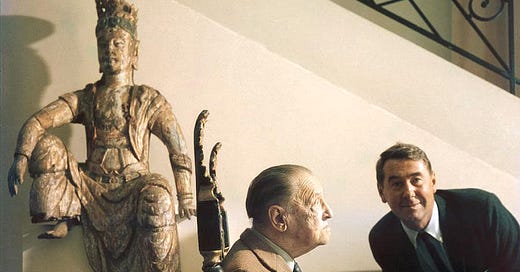“To acquire the habit of reading is to construct for yourself a refuge from almost all the miseries of life.”
— Somerset Maugham

W. Somerset Maugham was one of the most prolific and celebrated writers of the 20th century, renowned for his novels, short stories, and plays that explored the complexities of human nature with wit and sharp insight.
Table of Contents: Early Life and Background / Initial Literary Career / Success as a Playwright / Big Break / Further Success / Later Years on the French Riviera / Did you know what happened later?
If you aren’t subscribed yet, hit the subscribe button below to receive the Adorable Stories every weekend, directly in your inbox:
Early Life and Background
William Somerset Maugham was born on January 25th, 1874, in the British Embassy in Paris, France.
He was the sixth and youngest child of Robert Ormond Maugham, a British lawyer stationed in Paris, and Edith Mary Snell.
Being born on embassy grounds ensured that Maugham would automatically be recognized as a British citizen under British law, regardless of the fact that he was born in France. This was important to expatriates and diplomats in the 19th century, as nationality laws were stricter and more complex than they are today.
Sadly, his mother died of tuberculosis when he was only eight years old, and just a few months later, his father passed away from cancer. These events left him orphaned before his 10th birthday.
From Paris, he was sent to live with his uncle, Reverend Henry MacDonald Maugham, in Whitstable, England—a small town just north of Canterbury.
After spending the first ten years of his life in the French capital, Maugham found an unwelcome contrast in life at Whitstable, which according to his biographer Ted Morgan,
“represented social obligation and conformity, the narrow-minded provincialism of nineteenth-century small-town English life.”
The strict and unkind environment of his uncle’s home left a deep impression on him, fostering feelings of alienation that would resonate throughout his work for the rest of his life.
As a consequence, young Maugham developed a stammer which further contributed to his sense of social insecurity and isolation.
After attending schools in England and Germany, Maugham initially pursued a career in medicine, studying at St. Thomas’s Hospital in London. He qualified as a doctor in 1897, but his passion for writing soon took precedence over practicing medicine.
Initial Literary Career
“I only practiced medicine to earn a living. The moment I could do so by writing, I gave it up without a pang.”
— Somerset Maugham
Maugham’s first novel, Liza of Lambeth (1897), a story of working-class adultery and its consequences, drew on his experiences as a medical student in London’s working-class districts.
The book was both a critical and commercial success upon its publication as readers were drawn to its vivid realism, relatable characters, and emotional depth.
The novel earned Maugham around GBP 100 in royalties (equivalent to several thousand pounds today), which was a relatively good sum for a first-time author: this initial success gave him confidence that he could earn a living from writing and so he decided to abandon his career in medicine.
Keep reading with a 7-day free trial
Subscribe to Adorable Times’ Newsletter to keep reading this post and get 7 days of free access to the full post archives.





